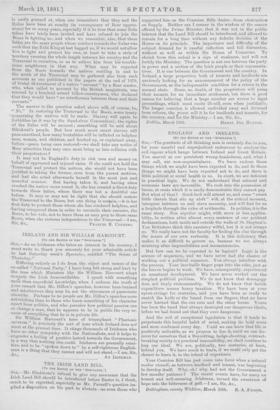ENGLAND AND IRELAND.
(To THE EDITOR OF THE “SPEOTATOR.1 Silt,—The gratitude of all thinking men is certainly due to you, for your manful and unprejudiced endeavour to analyse the evil vapour which hangs between Ireland. and Great Britain. You marvel at our persistent wrong-headedness, and, what may call, our non-sequentialness. We leave undone those things which we might have been expected to do, and do those things we might have been expected not to do, and there is little political or social health in us. In short, we are deficient in practical logic. We do not understand that natural and economic laws are inexorable. We rush into the possession of farms, at rents which it is easily demonstrable they cannot pay But what of that P Good-luck will attend us, and some " sweet little cherub that sits up aloft" will, at the critical moment, interpose between us and stern necessity, and will find for us a loophole through the rules of arithmetic. In politics, it is the same story. Non sequitur might, with more or less applica- bility, be written after almost every sentence of our political declamations, both inside and outside the walls of St. Stephen's. You Britishers think this casuistry wilful, but it is not always so. We really have not the faculty for finding the clue through the mazes of our own verbosity. It is this deficiency that makes it so difficult to govern us, because we are always straining after impossibilities and inconsistencies.
But how can we be expected to be logical ? Logic is the science of sequences, and we have never had the chance of working out a political sequence. You always interfere with the process. Your inevitable finger pops into the cake, just as the leaven begins to work. We have, consequently, experienced an unnatural development. Wo have never worked out the simplest political problem. We do not know that demagogy does not imply statesmanship. We do not know that lavish expenditure means heavy taxation. We have been at your apron-strings for centuries, and you have been so ready to snatch the knife or the brand from our fingers, that we have never learned that the one cuts and the other burns. Yours has been the hand that always destroyed our dangerous ideals, before we had found out that they were dangerous.
And the evil of exceptional legislation is that it tends to perpetuate this baneful habit of mind, making its bold more and more confirmed every day. Until we can learn that life is positively unlivable, as we propose to live it, until we can dis- cover for ourselves that a Boycotting, hedge-shooting, contract- breaking society is a practical impossibility, we shall continue to hug our ideal. We are, politically, two centuries, at least, behind you. We have much to learn, if we could only get the chance to learn it, iu the school of experience.
Your Coercion Bill has just come into force when a natural modus vivendi, as between landlord and tenant, was beginning to develop itself. Why, oh! why, had not the Government a few months patience ? The recent events have, for many an honest and well-meaning Irishman, turned the sweetness of hope into the bitterness of gall.—I am, Sir, &c., Daltinglass, county Wicklow, March 10th. E. A. FISUER.


































 Previous page
Previous page